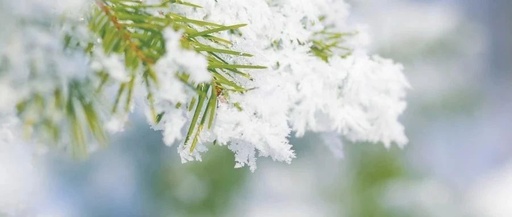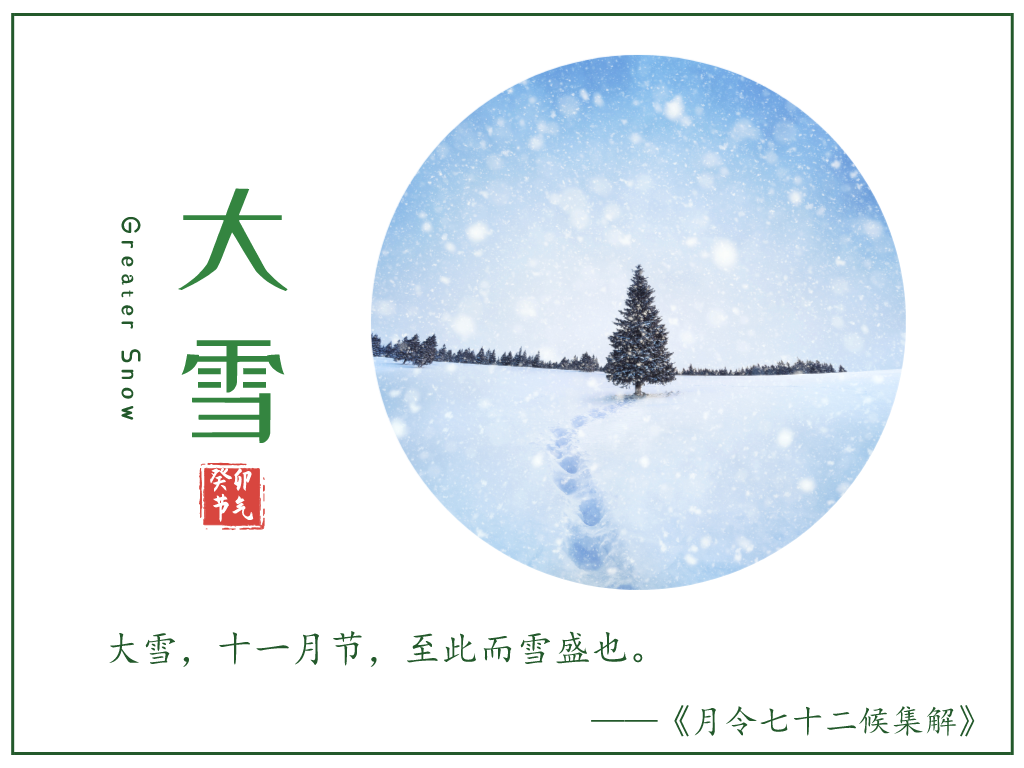
Today, on December 7, 2023 (the 25th day of the 10th month in the year of Gui Mao), at 17:32, the sun reaches the celestial longitude of 255°, marking the arrival of the Great Snow (Da Xue) in the Northern Hemisphere according to the 24 solar terms.
From the “Collected Explanations of the 72 Seasonal Phenomena”: “Great Snow, the eleventh month, marks the time when snow is abundant.”
The Great Snow solar term signifies a gradual drop in temperature due to the influence of cold currents, making the weather colder and increasing the likelihood of snowfall compared to the Lesser Snow (Xiao Xue) solar term, hence the name Great Snow. However, sometimes in winter, there can be a situation where “Great Snow and Lesser Snow do not see snow.”
There are three phenomena during Great Snow. First: the black-crowned crane (Hé dàn) does not call (birds do not chirp in cold weather); second: the tiger begins to mate (Yin energy is at its peak, Yang energy begins to stir); third: the lychee sprouts (feeling the Yang energy, new buds emerge).The Great Snow solar term is the period when the sun’s direct rays move to the southernmost point in the Southern Hemisphere, and by the next solar term, Winter Solstice (Dong Zhi), the sun’s direct rays reach the Tropic of Capricorn, then reverse northward, hence the saying “Winter Solstice brings forth Yang.” During this period (from Great Snow to Winter Solstice), the Northern Hemisphere receives the least Yang energy, making it the time of year with the most abundant Yin and cold. However, Great Snow is not the coldest time. As the saying goes: “Heat occurs during the Three Fu, cold during the Three Nine.”
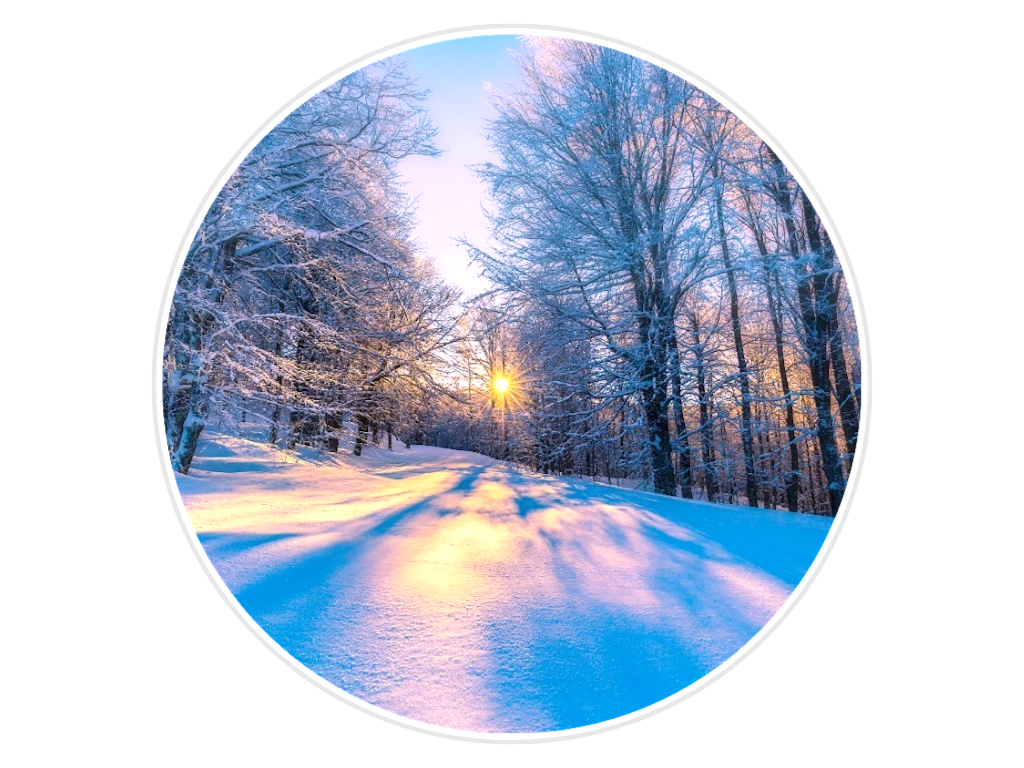
The main factors affecting the Five Movements and Six Qi during the Great Snow solar term of the Gui Mao year are: The middle movement of fire is insufficient (water movement is overly strong): this can cause cold and weak individuals to experience cold and pain in the lower back. The Qi of the spring is the fire of the Lesser Yin: warmth within the cold can lead to carelessness, making one susceptible to wind and cold. The Five Movements and Guest Qi are too strong (wood movement is excessive): liver Qi is activated, hiding unfavorable conditions; Yang energy leaks outward, causing fatigue; poor drainage leads to headaches and toothaches, and shallow sleep at night. The main movement of the Five Movements is too strong (water movement is excessive): this can cause cold and weak individuals to experience cold and pain in the lower back. The Six Qi Guest Qi (the seasonal Qi) is the fire of the Lesser Yin: internal heat can lead to carelessness, making one susceptible to wind and cold. The main Qi of the Six Qi is the cold water of the sun: cold Qi can invade, easily causing cold and weak individuals to experience cold and pain in the lower back, and suffer from wind-cold colds.
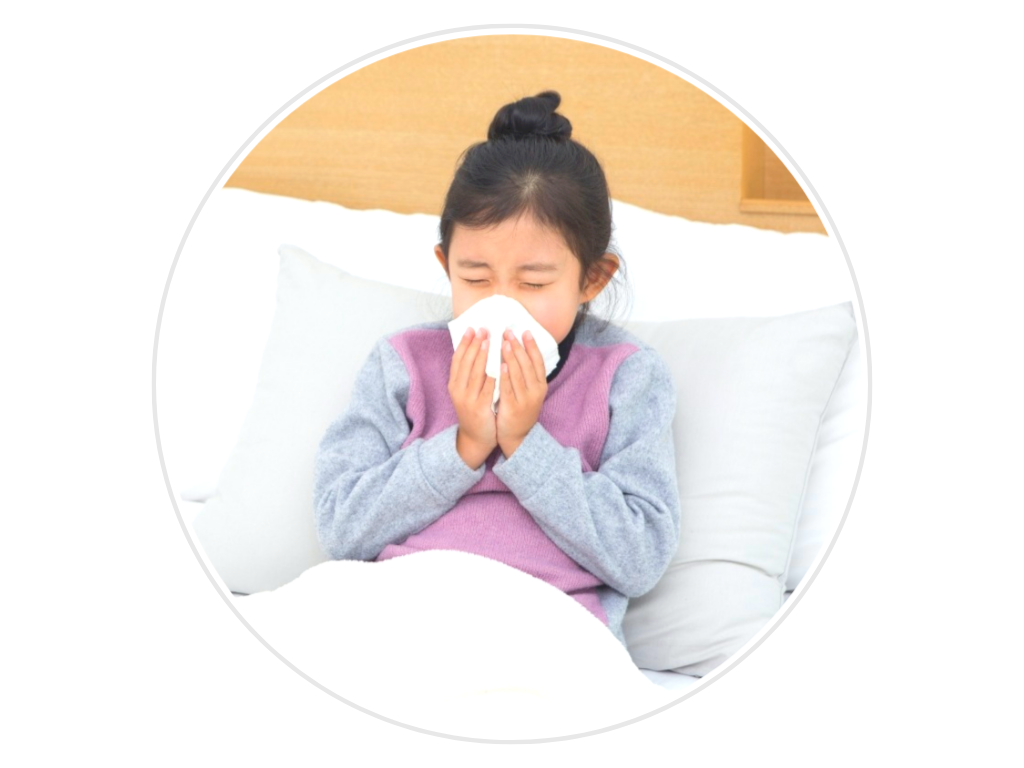
The fire of the Lesser Yin represents the Qi of late spring and early summer, governing the climate of winter, referred to as “Winter carries the orders of spring and summer.” This climate makes it difficult for Yang energy to hide and leads to its leakage. When Yang energy leaks, the interior becomes empty, allowing cold Qi to invade. In years when fire movement is insufficient, water comes to invade; excessive water overcomes fire, leading to a resurgence of earth. Earth governs dampness, combined with the cold of the main movement and Qi of water, creates damp cold. On sunny days, it is difficult for Yang energy to hide, leading to heat above and cold below. On rainy and snowy days, damp cold predominates, which can easily harm muscles and bones. The liver governs tendons, and the kidneys govern bones and store essence, leading to symptoms of liver and kidney deficiency, such as heat in the upper jiao (heart and lungs), soreness and numbness in the lower back, weakness in the lower limbs, and swelling in the legs and feet.In summary, the climatic situation during the Great Snow solar term of the Gui Mao year is a clash of cold and heat. It can also be said to be a clash between the weather and the earth’s Qi. “When the movements and Qi are not harmonious, all things suffer.” The heat radiation from the planets in the solar system corresponds to the heart and liver circulatory systems in the human body, causing them to thrive in winter instead of hiding, similar to trees budding and flowering in winter, making them susceptible to cold damage. The heart is the sovereign organ, the lungs are the ministerial organ, and the liver is the general organ; once these three are disturbed by cold evil, it can lead to the outbreak of warm diseases. Therefore, after the Great Snow solar term, the focus of seasonal health preservation is: resisting the cold and nurturing Yang. Specific dietary and lifestyle recommendations are as follows:1
Preventing Colds
During this phase, the seasonal Qi and the Qi of the spring are both the fire of the Lesser Yin, causing internal heat in the body, leading to a false sense of warmth and relaxation of vigilance, allowing external cold to enter. Do not reduce clothing until sweating stops. Change inner clothing frequently to avoid external pathogens.
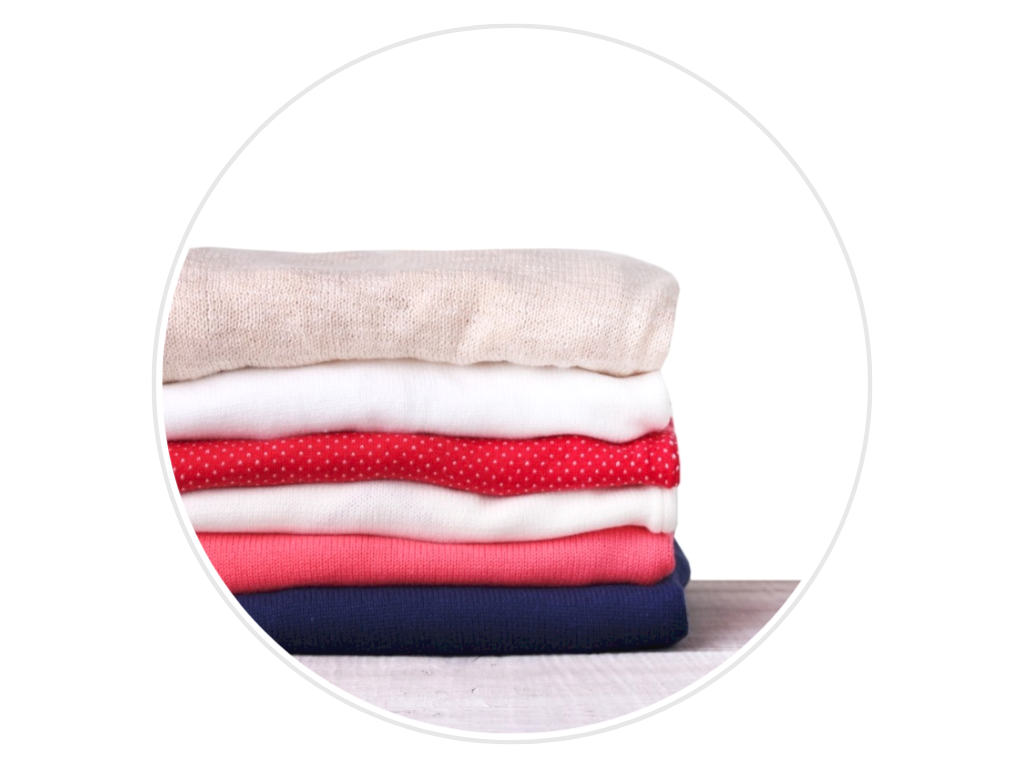
If you wake up at night, feeling neither cold nor sleepy, it indicates that Yang energy is abundant; you should nourish Yin through diet and retain heat in the kidneys, ensuring comfort without overheating. Continuing to sleep indicates a balance of Yin and Yang.For any cold or fever, it is essential to distinguish between cold and heat. Confusing the two can lead to opposite treatments. If you fear heat, consume cooling and Yin-nourishing foods, retaining Yang in the kidneys. If you fear cold, consume a small amount of foods that strengthen the spleen or warm the kidney Yang; stop when you no longer fear the cold. If you overcorrect and no longer fear cold but fear heat, consume cooling and Yin-nourishing foods again, retaining Yang in the kidneys.2
Protecting the Upper Jiao
Before the Winter Solstice, Yin energy is at its heaviest; avoid cold and keep warm to protect Yang.Especially for those with a constitution of cold deficiency, it is crucial to keep the head, neck, back, and feet warm.In the cold North, when going out, always wear a hat, scarf, and mask, and wear high-necked warm clothing to protect the neck and areas with thinner subcutaneous fat, such as the Dazhui (大椎), Fengchi (风池), and Fengfu (风府) acupoints.Those with Qi deficiency who often have cold hands should wear appropriately thick gloves to keep their palms and fingers warm.Individuals with cold deficiency in their bodies should wear protective gear (neck, waist, knee, hands, feet, and ankles) to avoid cold exposure.Spices like Sichuan pepper and star anise can be placed inside protective gear.
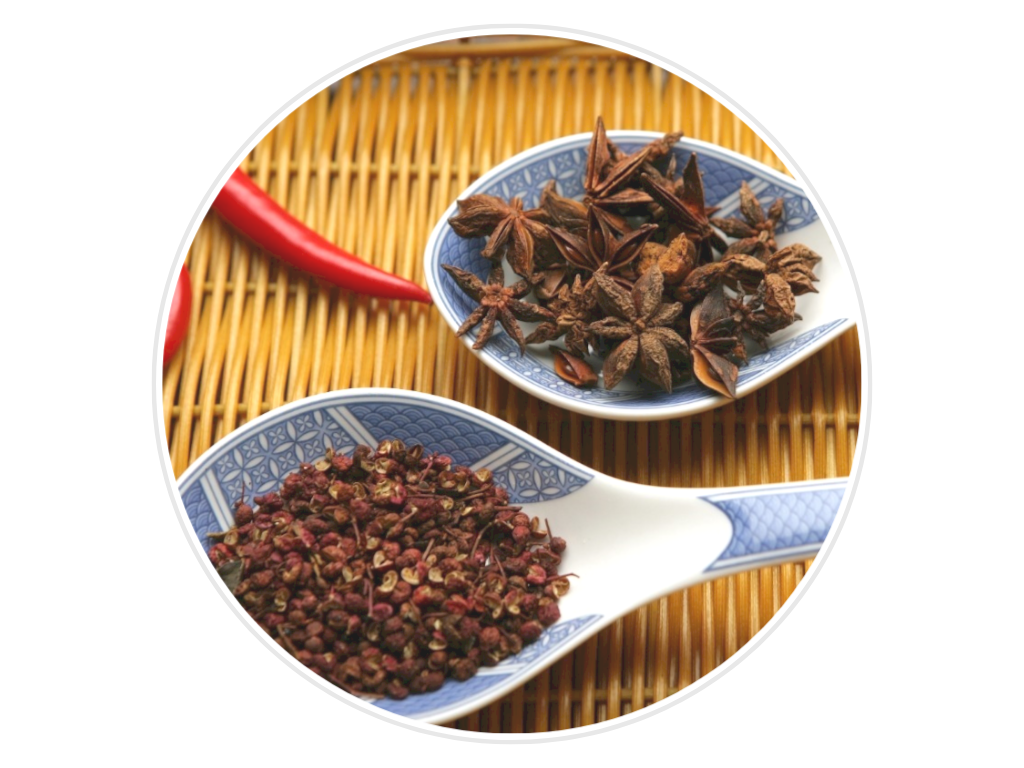
During sleep, the body’s ability to resist cold decreases, especially for those with spleen deficiency and insufficient Wei Qi. Therefore, when sleeping, wear a sleep cap and long-sleeved pajamas with collars, keeping the neck, shoulders, and arms under the covers. If you find your hands and feet are warm and cannot be covered by the blanket, immediately consume Yin-nourishing foods for the heart or kidneys, ensuring that your limbs can be covered by the blanket.3
Avoid Overeating
“Winter carries the orders of spring and summer,” with excessive wood and fire Qi.Wood corresponds to the liver, fire corresponds to the heart, and the Yang energy of the kidneys hibernates, easily transforming into liver Qi that seeks to act, which can lead to liver Yang and heart Yang being improperly hidden.Daily diet should include sour and bitter flavors, avoiding spicy foods that stimulate liver and heart Qi.Sour flavors are astringent and consolidate, while bitter flavors drain the heart and nourish the kidneys, helping Yang to hide.
It is recommended to consume more black foods, such as black beans, which are black in color and belong to water, known as the “grain of the kidneys.” Chestnuts, hazelnuts, pine nuts, and walnuts are also beneficial for kidney essence and Qi. Seasonal winter vegetables, such as napa cabbage, potatoes, yam, radishes, sweet potatoes, and taro, all possess winter-storing properties, especially tubers, which are excellent for tonifying Qi and strengthening the spleen and stomach, making them the first choice for assisting winter storage.
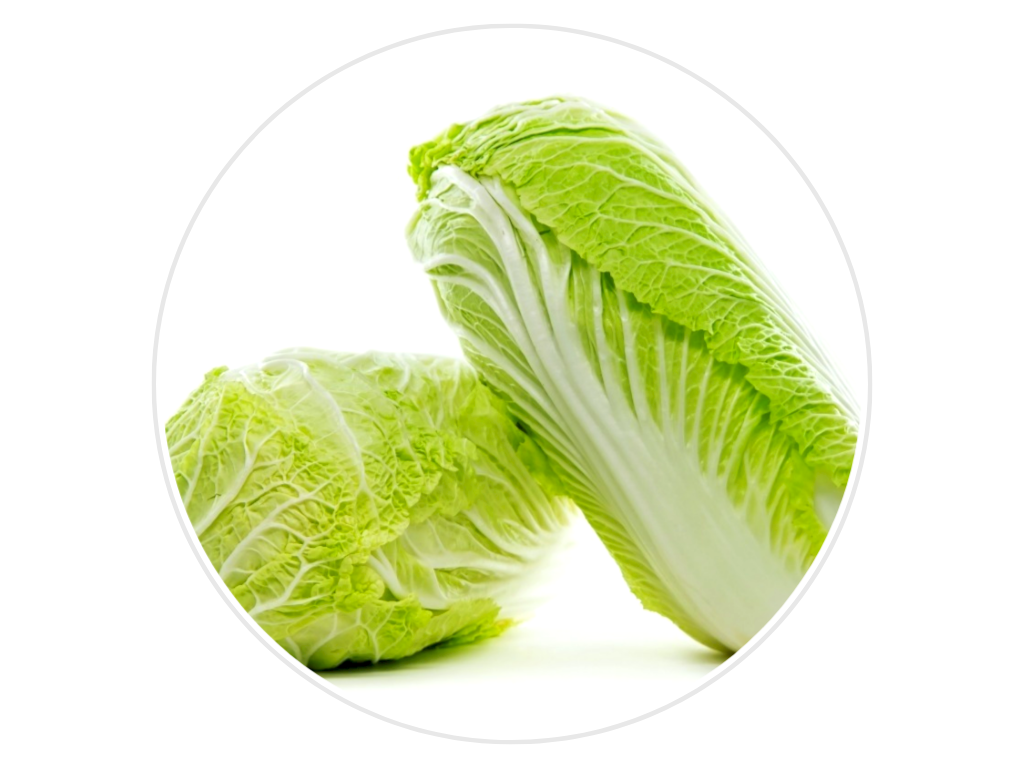
For individuals with weak spleen and stomach, dietary intake needs to be especially moderated. Blindly overindulging can easily lead to food stagnation and blockages in the intestines and stomach. Different supplementation methods should be chosen based on the three factors of time, place, and person. If the body is not functioning smoothly, especially if there is stagnation in the middle jiao, it is necessary to clear the intestines before supplementation.4
Winter Sunbathing
During the Great Snow solar term, the heavens and earth are closed off, and the upper and lower are not connected. With winter carrying the orders of spring and summer, it is difficult for Yang energy to hide, which also affects the body, emotions, and desires. Wearing too thin clothing or having too low indoor temperatures can easily deplete Yang energy, leading to colds; wearing too thick clothing or having too high indoor temperatures can easily open the pores, allowing cold evils to invade. The abdomen is Yin, while the back is Yang. Those with a tendency to cold deficiency can go out to bask in the sun during sunny days to warm the meridians, strengthen Yang energy, and improve cold deficiency conditions. At the same time, it is essential to adjust one’s mindset, engage in activities like playing musical instruments, chess, calligraphy, and painting, and maintain an optimistic outlook.As the Great Snow approaches, amidst the clash of cold and heat in heaven and earth, seek appropriate methods to resist the cold and nurture Yang, live in harmony with the seasons, and savor the warmth of life. Daily incense burning, quiet sitting, tea tasting, and reading are not only for self-cultivation but also to provide an inner strength when life pushes you back into the mire! Accumulate strength during winter storage, awaiting the boundless spring light of the coming year, which is also a unique romance of winter.
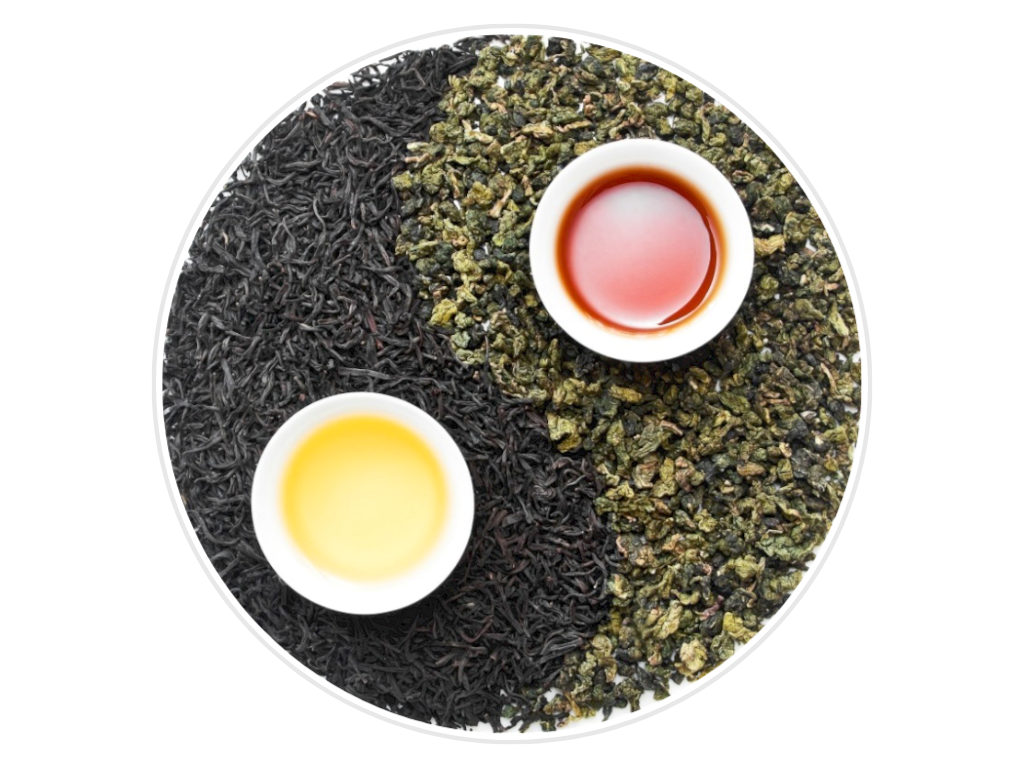
Appendix: The Correspondence Table of the Twelve Meridians and the Twenty-Four Hour System
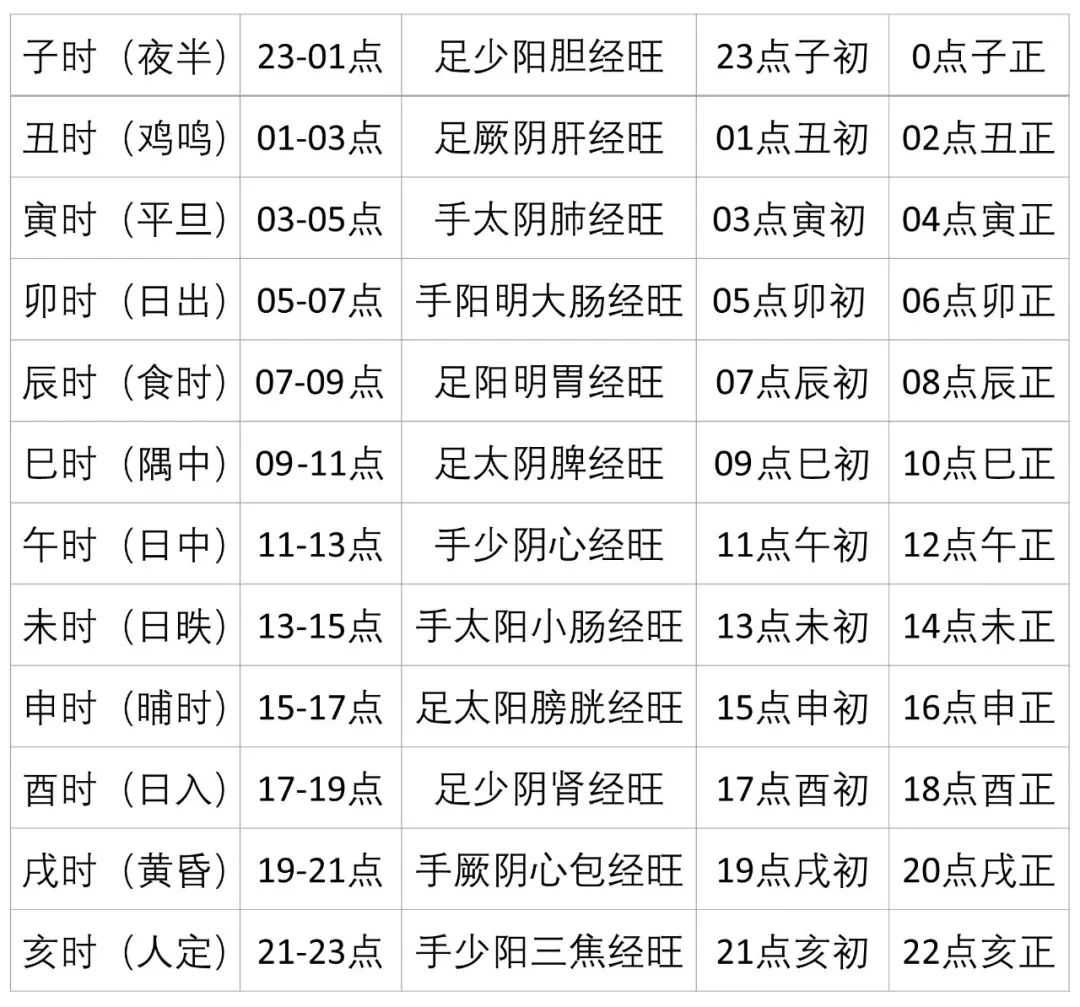
Note: The above times are based on Beijing time (120 degrees east longitude). Each location should calculate the time difference based on its longitude compared to Beijing time, which can be referenced in Baidu’s “True Solar Time Calculation and Major Cities in China”.
———— / END / ————
Author: Health Preservation Article Guidance Group
Written by: Wang Zhenyu
Reviewed by: Cheng En | Edited by: Wang Nan
Group members: Cheng En, Wu Ping, Wang Zhenyu, Li Fujun, Li Wei, Liu Xinsu, etc.Original textSome images sourced from the internet
We welcome everyone to follow our public account. If you have any questions, please leave a message, and a dedicated person will respond.
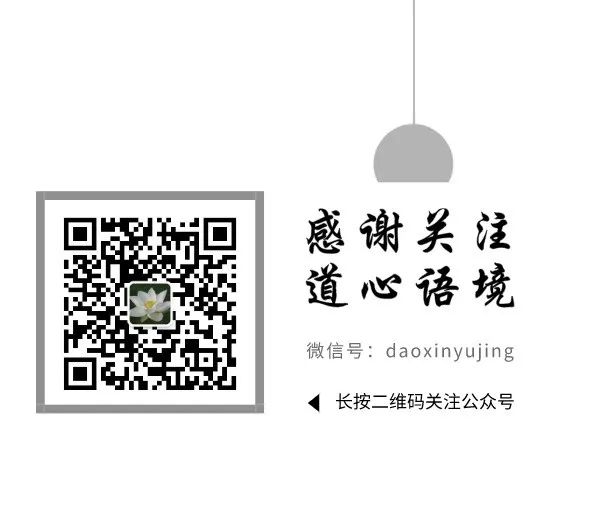
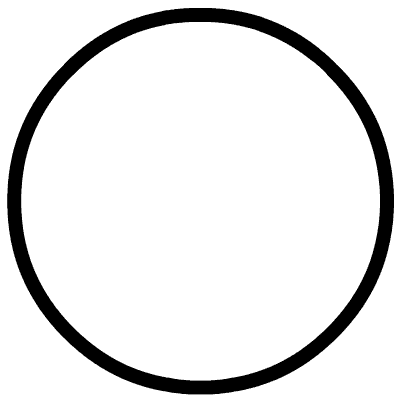
Click below “Read the original text” for more articles

